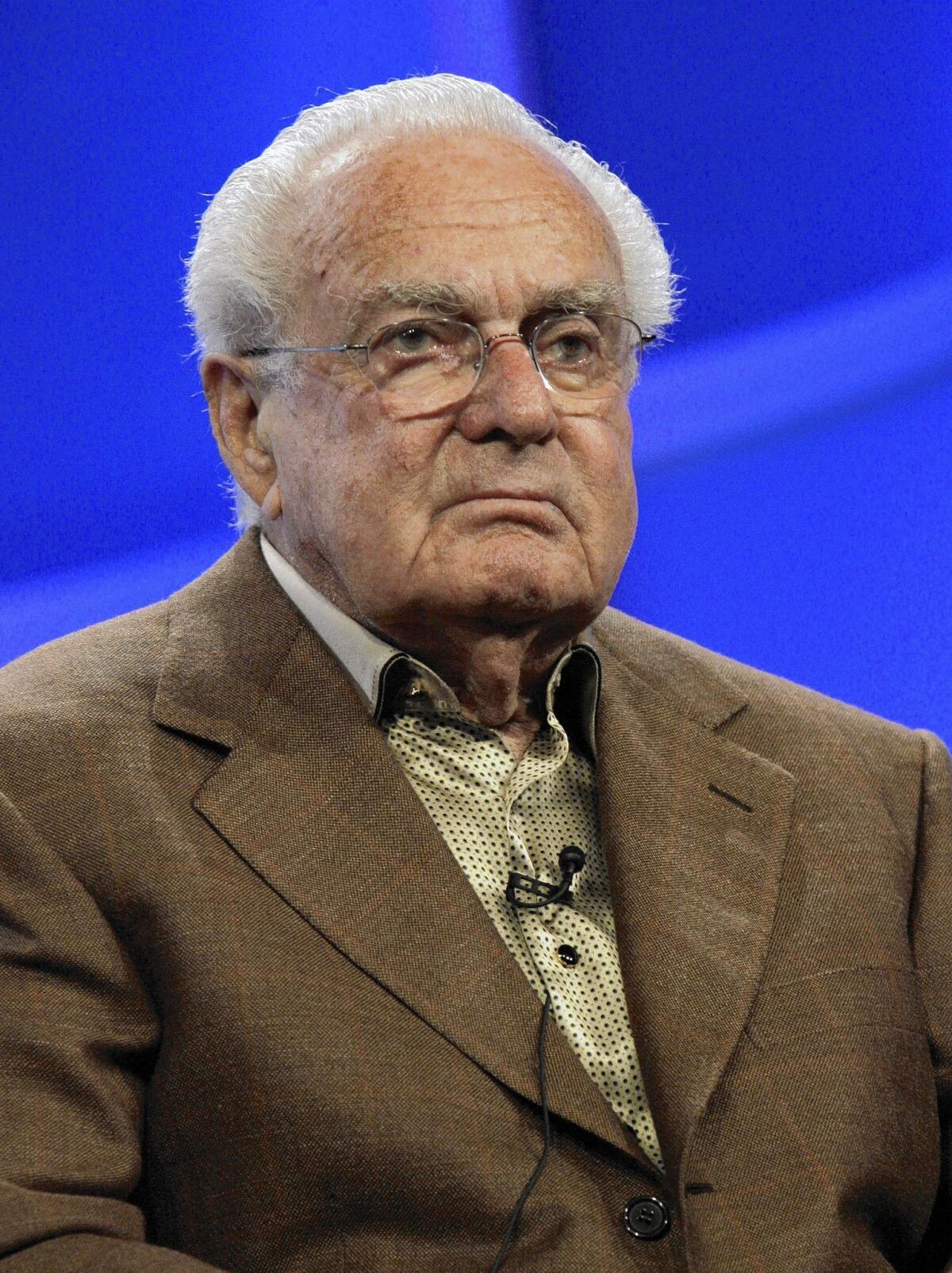Robert Halmi Sr. dies at 90; producer specialized in TV miniseries

Nobody ever accused Robert Halmi Sr. of thinking small. With more than 200 TV miniseries and films to his credit, Halmi produced sagas that were as outsized and dramatic as his own life.
Excited about the miniseries potential of Hannibal’s trip over the Alps, he was once asked where he’d find the elephants.
“That’s easy!” he said. “I already have the elephants.”
And he well might have.
At one point, Halmi, a Budapest-born impresario who introduced millions of TV viewers to classic stories like “The Odyssey,” “Don Quixote” and “Gulliver’s Travels,” owned a 1,000-acre game preserve in Kenya as well as a villa in the south of Spain, a home in London and an 89-foot yacht named “Bad Caroline,” after his wife.
He died Wednesday of a brain aneurysm at his apartment in New York’s Greenwich Village, said Russ Patrick, a family spokesman. Halmi was 90.
Halmi’s productions won 136 Emmy awards and were nominated for 480, Patrick said.
In 1989, Halmi championed the production of “Lonesome Dove,” the Larry McMurtry epic about a cattle drive led by a couple of retired but rough-and-tumble Texas Rangers, played by Tommy Lee Jones and Robert Duvall.
“CBS didn’t believe in it at all,” Halmi said in a 2007 interview by the Archive of American Television. “It was eight hours — that’s horrible! — eight hours of Western. Who would sit through that?”
“Lonesome Dove” drew millions of fans and was later turned into the “best-selling Western DVD of all time,” according to Texas Monthly magazine.
“If you know a Texan named Gus under the age of 20, odds are he was named after McCrae,” wrote John Spong, alluding to Duvall’s character of Augustus McCrae. “I know two such kids — and one is a girl.”
In the 1990s, Halmi, who often worked with his son Robert Halmi Jr., turned out hit after hit in a heavily marketed genre that came to be called “event TV.” In 1996, there was “In Cold Blood” and “Gulliver’s Travels.” In 1997 came “The Odyssey,” “Robinson Crusoe” and “20,000 Leagues Under the Sea.” They were followed in 1998 by “Moby Dick,” with “Animal Farm” appearing in 1999 and “The Arabian Nights” in 2000.
“His passion for books that many have heard of but probably not read is as old-fashioned as many things about Halmi,” The Times said in a 1999 profile, describing him as “a throwback to another era when dynamic European movie moguls populated Hollywood.”
Like other moguls, Halmi did not always satisfy the critics. When he veered from George Orwell’s “Animal Farm” by giving the grim parable a happy ending, critics panned it. However, Halmi embraced it; Orwell, he said, did not live to see the Berlin Wall topple and the Soviet Union collapse.
Born Jan. 22, 1924, Halmi grew up in privilege, the son of Bela, the official photographer of the Hapsburg royal family, and Sarah, a theater critic and playwright.
He attended private schools and studied economics at Budapest University. As a young man during World War II, he joined the Resistance and was imprisoned at a Nazi slave labor camp in Poland. He was liberated by the Russians but later jailed again by the Communist regime in Hungary.
In 1951, Halmi arrived in New York with $5, a Leica camera and fluency in English. He managed to get a job as a baby photographer and then, with the help of American journalists he had befriended in Europe, he landed assignments with Life magazine.
Years before he started to make outdoor adventure documentaries, Halmi was a daredevil still photographer. He made memorable shots on safari in Africa, on an ice floe in Alaska, dangling from a helicopter over a New York skyscraper.
“He attacked life,” his son Robert, who is known as Robi, said Thursday. “We always thought of him as a cross between Merlin, Santa Claus and Hemingway. By the time we were 7, he’d taken us on crazy adventures around the world.”
As a team, father and son divided tasks, with Robert Jr. handling finances.
Robi often chided his father for spending too freely.
“You spend more money on gardeners than I do on food,” he said in a letter his father subsequently framed. “This might be understandable, except for the fact that you don’t have a garden.”
Hallmark purchased their firm in 1994, and the Halmis later left it.
In addition to his son Robi and his wife, Caroline, Halmi’s survivors include sons Bill and Kevin; daughter Kim Sampson; and 13 grandchildren.
His most recent work, “The Baby Sellers,” a movie about the illicit international trade in newborns, appeared on Lifetime last year. By his count, it was his 231st film.
At the time of his death, he was working on “Olympus,” a 13-part Greek mythology-based series being filmed for the Syfy Channel.
He often said he could never comprehend retiring, even if he had to keep a breakneck schedule that would exhaust people much younger.
“I hate Sundays,” he once told a reporter. “There’s no one to call.”
Twitter: @schawkins
More to Read
Start your day right
Sign up for Essential California for the L.A. Times biggest news, features and recommendations in your inbox six days a week.
You may occasionally receive promotional content from the Los Angeles Times.






